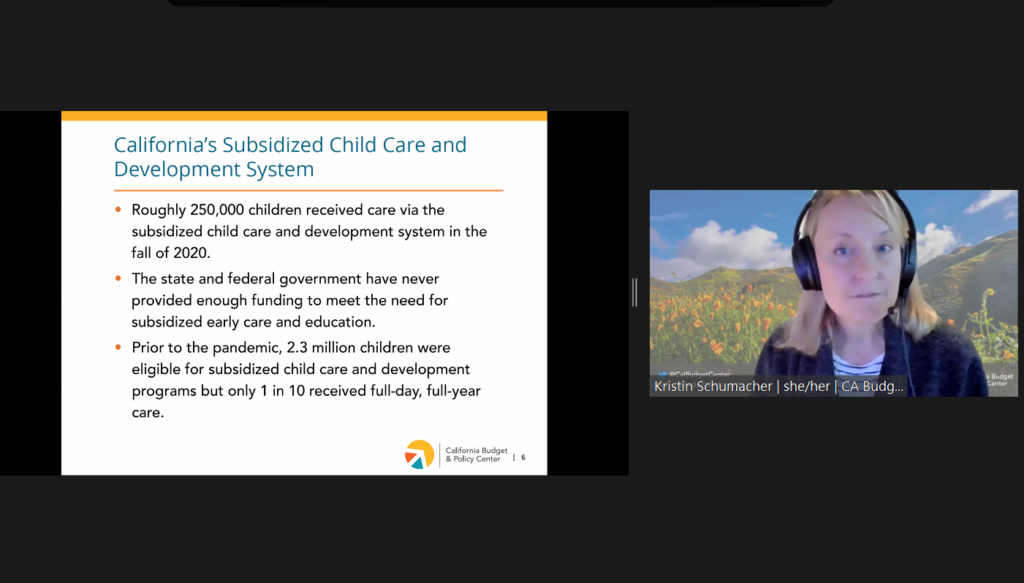Speaking to a virtual audience, a Los Angeles area child care provider shared Friday at CCRC’s Policy Forum that like many other providers, enrollment in her care program has declined significantly since the start of the pandemic.
“The most dramatic change is in our part-day preschool program – these are families who don’t need day care, they bring them in for socialization – the number of enrolled children dropped from 63 to 27,” provider and panelist Lisa Wilkin said. From the 761 children enrolled overall in her program in January 2020, there are now just 581 children in her care.
The decline in children enrolled isn’t the only notable shift in the industry, which is currently experiencing challenges with hiring.
“In all my years, to get no applicants from Indeed over a period of weeks is just kind of surreal,” shared provider and panelist Mary Cutone. “Usually we have to have staff to sort applicants and now we have like no applicants or under qualified applicants, of course.”
These hardships don’t mean there isn’t a need for child care. In fact, many families who require care report that they can’t find a program that meets their needs with open slots for their children.
“If you consider the number of young children, kids, birth to five, who are currently served under our federal child care assistance program under (California Department of Family Services), we only account for about 6% of those kids, until Build Back Better passes,” shared panelist Mario Cardone, Child Care Aware of America Chief of Policy and Practice. “Once it’s fully realized, it would cover about 90% of children. And so it would be a radically different system than the one that we have today and would provide a significant support and benefit to children and the families and providers.”
But with the Build Back Better Plan stalled in Congress, local agencies and advocates across California are preparing for any outcome because families can’t wait for affordable, quality care. Likewise, early childhood educators and care providers deserve a living wage and job security.
“Prior to the pandemic, 2.3 million children were eligible for subsidized child care and development programs but only one in 10 received full day, full year care,” said Kristin Schumacher, Senior Policy Analyst at the CA Budget and Policy Center. “Additionally, providers offering the subsidized care are reimbursed on outdated and inadequate payment rates. This undervaluing of caregiving generally is a systemic issue. And it’s a function of structural racism and sexism, given that these critical jobs are filled overwhelmingly by women and disproportionately by women of color.”

Schumacher noted findings from her office that earnings of child care providers and teachers fall within “the bottom 7% of over 700 occupations in California.”
Panelists shared the belief that there is a way to successfully adapt Governor Gavin Newsom’s plans to implement Universal Transitional Kindergarten (UTK), which he outlined for all 4-year-olds by 2025, but it will take careful consideration.
“(States with a functioning UTK) have all been successful because they worked within the existing child care structure, including community based organizations, family child care homes and in care homes, so that they do not dismantle the entire existing early care education community as we just heard from our providers is increasingly fragile,” argued Nina Buthee, Executive Director, Every Child California.
L.A. Unified School District Board President Kelly Gonez supports the UTK plan but said she expects school districts will need to partner with Resource and Referral agencies and community partners to make it a success. “I also envision that we will work and create close partnerships with our partners in the child care space, home providers, etc. to make sure that we’re meeting all of the needs of our families who we know need access to care throughout the year.”
Year-round child care, as well as parent choice of provider, teacher qualifications and access for vulnerable families are among the many concerns raised by CCRC and other child care advocates. These are all issues Jackie Wong, Washington Unified School District Board President, says her district had to consider when it implemented universal preschool in 2006.
“Quality isn’t a rating system per se, it’s actually meeting providers where they are,” she shared, adding that lasting infrastructure and community support will be critical components of California’s program. “How do we understand that this is a whole community effort and begin to talk to the people and the cities and communities to understand we cannot do this alone? We have to build an infrastructure that lives beyond, quite frankly, our elected legacies, whatever that may be.”
In her closing thoughts, Donna Sneeringer encouraged attendees to remain engaged in the important discussions around Universal Preschool and the direction of child care and early education. The future of our child care landscape necessitates input from families, providers, educators and advocates in order to best serve children, families and the community.
Watch the full event recording below:


